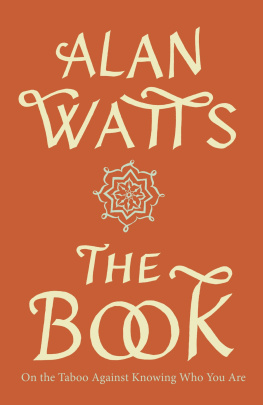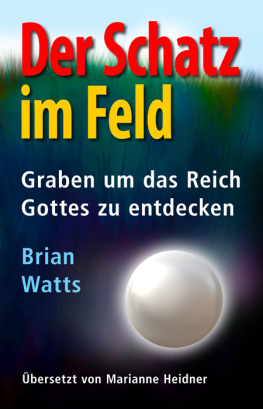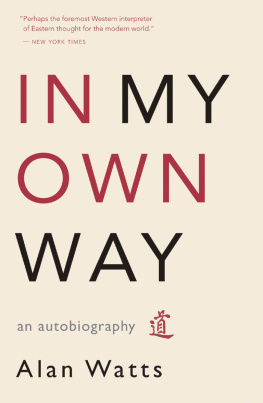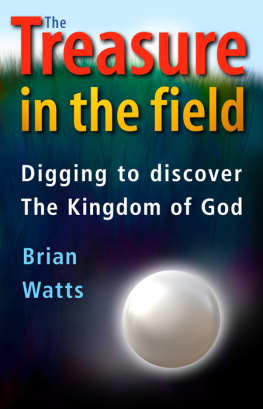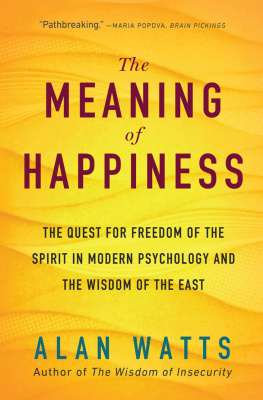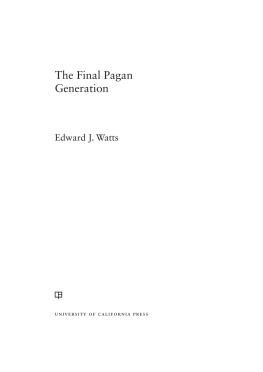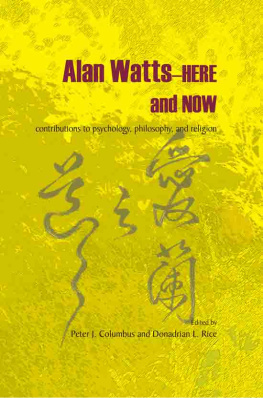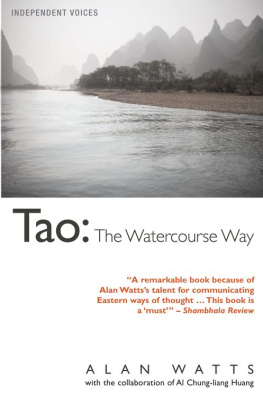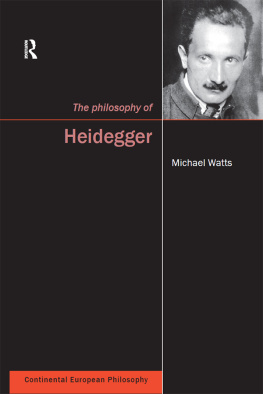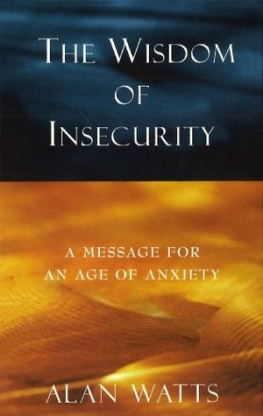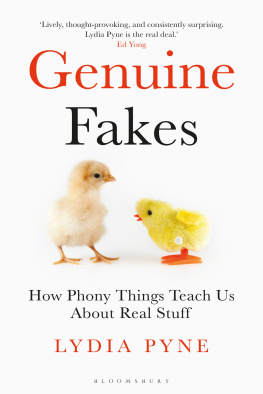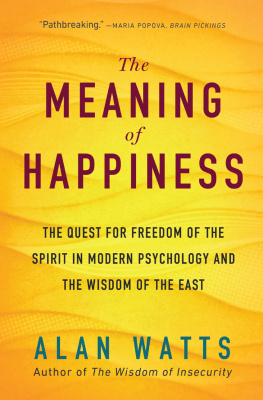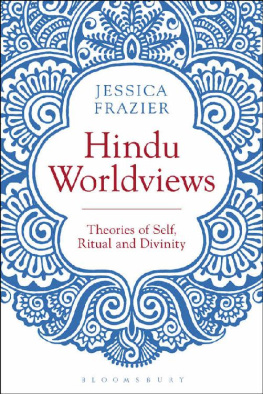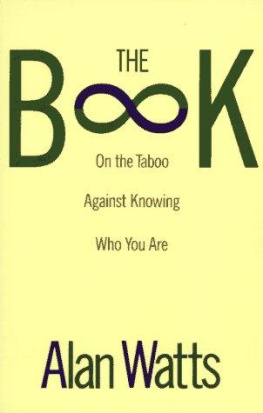Watts - The book: on the taboo against knowing who you are
Here you can read online Watts - The book: on the taboo against knowing who you are full text of the book (entire story) in english for free. Download pdf and epub, get meaning, cover and reviews about this ebook. City: New York, year: 2011;1989, publisher: Knopf Doubleday Publishing Group;Vintage Books, genre: Religion. Description of the work, (preface) as well as reviews are available. Best literature library LitArk.com created for fans of good reading and offers a wide selection of genres:
Romance novel
Science fiction
Adventure
Detective
Science
History
Home and family
Prose
Art
Politics
Computer
Non-fiction
Religion
Business
Children
Humor
Choose a favorite category and find really read worthwhile books. Enjoy immersion in the world of imagination, feel the emotions of the characters or learn something new for yourself, make an fascinating discovery.
The book: on the taboo against knowing who you are: summary, description and annotation
We offer to read an annotation, description, summary or preface (depends on what the author of the book "The book: on the taboo against knowing who you are" wrote himself). If you haven't found the necessary information about the book — write in the comments, we will try to find it.
Watts: author's other books
Who wrote The book: on the taboo against knowing who you are? Find out the surname, the name of the author of the book and a list of all author's works by series.
The book: on the taboo against knowing who you are — read online for free the complete book (whole text) full work
Below is the text of the book, divided by pages. System saving the place of the last page read, allows you to conveniently read the book "The book: on the taboo against knowing who you are" online for free, without having to search again every time where you left off. Put a bookmark, and you can go to the page where you finished reading at any time.
Font size:
Interval:
Bookmark:
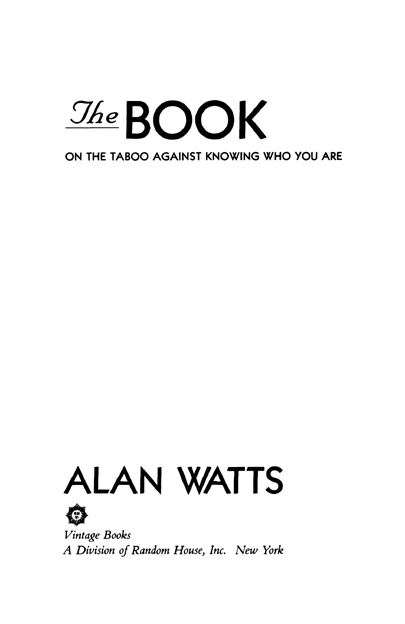
VINTAGE BOOKS EDITION, AUGUST 1989
Copyright 1966 by Alan Watts
All rights reserved under International and Pan-American Copyright Conventions. Published in the United States by Random House, Inc., New York, and simultaneously in Canada by Random House of Canada Limited, Toronto.
Originally published by Pantheon Books, a division of
Random House, Inc., in 1966.
Library of Congress Cataloging in Publication Data
Watts, Alan Wilson, 1915
The book: on the taboo against knowing who you are.
Bibliography: p.
I. Self. 2. Self-knowledge, Theory of.
I. Title.
[BD450.W3 1972] 128.3 72-4715
eISBN: 978-0-307-80787-8
The author is grateful to the following for permission to quote: Cambridge University Press for The Nature of the Physical World by Sir Arthur Eddington and My View of the World by Erwin Schrdinger.
Prentice-Hall, Inc., for Quantum Theory by David Bohm.
Copyright 1951 by Prentice-Hall, Inc.
E. J. Brill Ltd. for The Gospel According to Thomas, translated by
A. Guillaumont and others.
New Directions Publishing Corp. for Collected Poems of Dylan Thomas. Copyright 1953 by Dylan Thomas. Copyright 1957 by New Directions.
Dodd, Mead and Company, Methuen and Co., Ltd. and Miss D. E. Collins for The Collected Poems of G. K. Chesterton. Copyright 1932 by Dodd, Mead & Company, Inc.
v3.1
TO MY CHILDREN AND GRANDCHILDREN
Joan, David, Elizabeth, Christopher
Tia, Mark, Richard, Lila, Diane
Ann, Myra, Michael
T his book explores an unrecognized but mighty tabooour tacit conspiracy to ignore who, or what, we really are. Briefly, the thesis is that the prevalent sensation of oneself as a separate ego enclosed in a bag of skin is a hallucination which accords neither with Western science nor with the experimental philosophy-religions of the Eastin particular the central and germinal Vedanta philosophy of Hinduism. This hallucination underlies the misuse of technology for the violent subjugation of mans natural environment and, consequently, its eventual destruction.
We are therefore in urgent need of a sense of our own existence which is in accord with the physical facts and which overcomes our feeling of alienation from the universe. For this purpose I have drawn on the insights of Vedanta, stating them, however, in a completely modern and Western styleso that this volume makes no attempt to be a textbook on or introduction to Vendanta in the ordinary sense. It is rather a cross-fertilization of Western science with an Eastern intuition.
Particular thanks are due my wife, Mary Jane, for her careful editorial work and her comments on the manuscript. Gratitude is also due the Bollingen Foundation for its support of a project which included the writing of this book.
Sausalito, California
January 1966
A LAN W ATTS
J ust what should a young man or woman know in order to be in the know? Is there, in other words, some inside information, some special taboo, some real lowdown on life and existence that most parents and teachers either dont know or wont tell?
In Japan it was once customary to give young people about to be married a pillow book. This was a small volume of wood-block prints, often colored, showing all the details of sexual intercourse. It wasnt just that, as the Chinese say, one picture is worth ten thousand words. It was also that it spared parents the embarrassment of explaining these intimate matters face-to-face. But today in the West you can get such information at any newstand. Sex is no longer a serious taboo. Teenagers sometimes know more about it than adults.
But if sex is no longer the big taboo, what is? For there is always something taboo, something repressed, unadmitted, or just glimpsed quickly out of the corner of ones eye because a direct look is too unsettling. Taboos lie within taboos, like the skins of an onion. What, then, would be The Book which fathers might slip to their sons and mothers to their daughters, without ever admitting it openly?
In some circles there is a strong taboo on religion, even in circles where people go to church or read the Bible. Here, religion is ones own private business. It is bad form or uncool to talk or argue about it, and very bad indeed to make a big show of piety. Yet when you get in on the inside of almost any standard-brand religion, you wonder what on earth the hush was about. Surely The Book I have in mind wouldnt be the Bible, the Good Bookthat fascinating anthology of ancient wisdom, history, and fable which has for so long been treated as a Sacred Cow that it might well be locked up for a century or two so that men could hear it again with clean ears. There are indeed secrets in the Bible, and some very subversive ones, but they are all so muffled up in complications, in archaic symbols and ways of thinking, that Christianity has become incredibly difficult to explain to a modern person. That is, unless you are content to water it down to being good and trying to imitate Jesus, but no one ever explains just how to do that. To do it you must have a particular power from God known as grace, but all that we really know about grace is that some get it and some dont.
The standard-brand religions, whether Jewish, Christian, Mohammedan, Hindu, or Buddhist, areas now practicedlike exhausted mines: very hard to dig. With some exceptions not too easily found, their ideas about man and the world, their imagery, their rites, and their notions of the good life dont seem to fit in with the universe as we now know it, or with a human world that is changing so rapidly that much of what one learns in school is already obsolete on graduation day.
The Book I am thinking about would not be religious in the usual sense, but it would have to discuss many things with which religions have been concernedthe universe and mans place in it, the mysterious center of experience which we call I myself, the problems of life and love, pain and death, and the whole question of whether existence has meaning in any sense of the word. For there is a growing apprehension that existence is a rat-race in a trap: living organisms, including people, are merely tubes which put things in at one end and let them out at the other, which both keeps them doing it and in the long run wears them out. So to keep the farce going, the tubes find ways of making new tubes, which also put things in at one end and let them out at the other. At the input end they even develop ganglia of nerves called brains, with eyes and ears, so that they can more easily scrounge around for things to swallow. As and when they get enough to eat, they use up their surplus energy by wiggling in complicated patterns, making all sorts of noises by blowing air in and out of the input hole, and gathering together in groups to fight with other groups. In time, the tubes grow such an abundance of attached appliances that they are hardly recognizable as mere tubes, and they manage to do this in a staggering variety of forms. There is a vague rule not to eat tubes of your own form, but in general there is serious competition as to who is going to be the top type of tube. All this seems marvelously futile, and yet, when you begin to think about it, it begins to be more marvelous than futile. Indeed, it seems extremely odd.
It is a special kind of enlightenment to have this feeling that the usual, the way things normally are, is odduncanny and highly improbable. G. K. Chesterton once said that it is one thing to be amazed at a gorgon or a griffin, creatures which do not exist; but it is quite another and much higher thing to be amazed at a rhinoceros or a giraffe, creatures which do exist and look as if they dont. This feeling of universal oddity includes a basic and intense wondering about the sense of things. Why, of all possible worlds, this colossal and apparently unnecessary multitude of galaxies in a mysteriously curved space-time continuum, these myriads of differing tube-species playing frantic games of one-upmanship, these numberless ways of doing it from the elegant architecture of the snow crystal or the diatom to the startling magnificence of the lyrebird or the peacock?
Font size:
Interval:
Bookmark:
Similar books «The book: on the taboo against knowing who you are»
Look at similar books to The book: on the taboo against knowing who you are. We have selected literature similar in name and meaning in the hope of providing readers with more options to find new, interesting, not yet read works.
Discussion, reviews of the book The book: on the taboo against knowing who you are and just readers' own opinions. Leave your comments, write what you think about the work, its meaning or the main characters. Specify what exactly you liked and what you didn't like, and why you think so.

